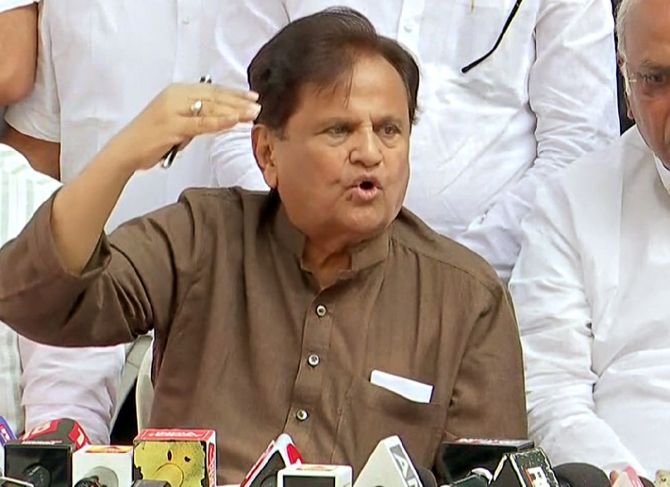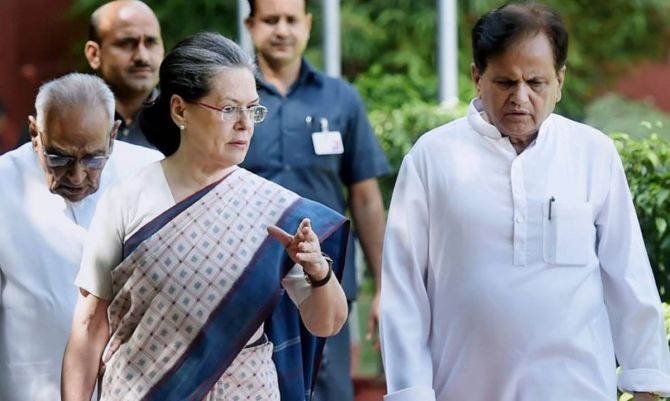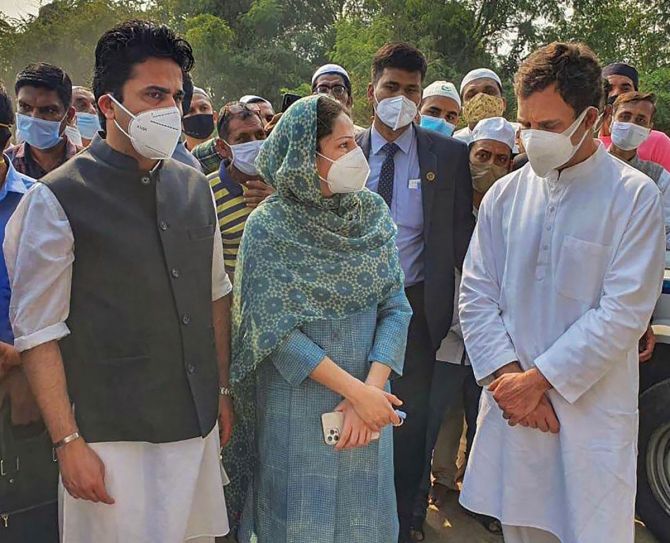'He always avoided eating non-vegetarian food in presence of his deputies if they were fasting for the month of Shravan.'
'There were no Hindu, Jain, Parsi and Swaminarayan festivals he would forget.'
'He was a conservative Muslim and therefore could get along well with conservative Hindus.'

Sheela Bhatt, the distinguished journalist and Rediff.com's former editorial director, knew Congress leader Ahmed Patel for 40 years.
Patel, always media shy, rarely granted interviews. Bhatt had the privilege to interview him a few times, at critical junctures in his career.
But they were family friends. In constant touch over the decades.
She and Ahmed Bhai, as Bhatt called him, often chatted about India, its future and Patel had unique political gyan (insights).
He was a warm man. Likeable. Unusual. And very Gujarati.
He loved ghazals and typical Gujarati farsan. He hated air travel and opted for the train.
Patel was a fascinating political leader and a special human being.
An old-style Congressman, Ahmed Bhai knew India intimately and was a reflection of the multi-faceted nature of India.
Sheela Bhatt reveals the Ahmed Patel most people didn't know in the first of a two-part interview with Rediff.com's Vaihayasi Pande Daniel:
Tell me when you first met Ahmed Patel. And your recollections of that first meeting.
I first met him when he was campaigning for his second Lok Sabha election in 1980 from Bharuch (in southern Gujarat).
He was highly respectful of my husband Kanti Bhatt and he treated me with respect.
In the beginning, I was merely Mrs Kanti Bhatt for him.
Kanti Bhatt had celebrity status then -- a highly distinguished journalist and prolific writer of his times.
So, he was kind of in awe of Kanti Bhatt and I benefitted from this reflected glory.
I met Ahmed Bhai at his farm in his ancestral village Piraman.
He gave me a good interview for a Gujarati magazine on contesting the election.
In the first meeting, it was apparent that though he was a politician, he was a very Gujarati in his dealings and hospitality.
He offered typical Gujarati hospitality.
His style of hospitality took him places.
What were your initial impressions of him as a leader? When you got to know him, how did your assessment change over the years?
At that time -- between 1980s and 1990s, in Gujarat, development was a buzzword.
Then chief minister, Madhavsinh Solanki and particularly his set of bureaucrats, were the first bunch of people who brought development centrestage.
Solanki and Ahmed Bhai were the original development men.
In his constituency, Ahmed Bhai re-designed, redeveloped the area around Bharuch station, the roads between Bharuch and Ankleshwar and Ankleshwar and his village (in southern Gujarat).
He brought many industries there. He supported hospitals, public spaces.
Between 1985 and 1995, if you got down at Bharuch or Ankleshwar station, you could understand that this is Ahmed Bhai's ilaka (turf).
The contrast between the development in these parts of Gujarat and places like Amethi, or other VIP constituencies, was quite visible.
The craving and demand for development and the ability to develop the state was there in Gujarat already.
Narendra Modi took it to the new level.
Ahmed Bhai in my eyes, in the beginning, was a person who could manage his constituency very well. That was the first impression.
The second impression, at that time, was that he was less of a Muslim and more of a Gujarati.
When he won his third Lok Sabha election, there was a victory procession. Rajiv Gandhi was also present, if I remember correctly.
On that day, Ahmed Bhai claimed, when the procession went through the streets of Bharuch, his adversaries planted miscreants in the crowd to shout pro-Pakistan slogans.
That was his first encounter with communal politics and politics based on differences in Hindu-Muslim identity.
Ahmed Bhai was shocked.
He had always avoided eating non-vegetarian food in presence of his deputies if they were fasting for the month of Shravan.
There were no Hindu, Jain, Parsi and Swaminarayan festivals he would forget.
He was a conservative Muslim and therefore could get along well with conservative Hindus.
Any other subsequent impressions?
He spoke very little and always behaved very gentlemanly.
Ahmed Bhai was sometimes irritatingly hospitable.
In the sense he would ask us repeatedly: 'Bolo kai kaam hoi toh? Bolo, what can I do?'
Like all journalists, I needed information. But most times he would talk only off the record.
For the purpose of comparison: Sonia Gandhi and Ahmed Bhai have spoken much less (on the record) on anything connected with India or Indian politics than Modi and Amit Shah have, so far.
In last 40 years, Ahmed Bhai spoke just three or four times on record with me.
But over a period of time we (journalists) began to understand his 'Yes', 'No' and 'Maybe'.
I called him Mr Yes, No And Maybe!
When you asked him very pointed questions, he would say 'No' or 'Maybe' and you could stretch an article out of it!

What do you think would have been Sonia Gandhi's view of Ahmed Patel as a person? How did she look upon him? How would she have viewed him?
I can't comment upon her views.
But while reporting on the party, we get lots of pointers to the facts and situations.
Sonia Gandhi and Ahmed Bhai's relationship had one common ground to stand upon. That was Rajiv Gandhi. Sonia viewed Ahmed Bhai as a person who had enjoyed her husband's total trust.
Mrs Gandhi was very aggressive in her mission to ensure Rajiv Gandhi's respectful place in the Congress party's history and in Indian political history.
She had deep angst against this entire Bofors episode and the way it was handled.
Sonia Gandhi wanted Rajiv Gandhi -- though he was not in power long enough -- to be remembered in a certain way and she was very, very, touchy and sensitive about this.
Ahmed Bhai understood her wishes and picked up this thread soon after Rajiv's assassination.
The memories of a leader have a huge role in politics. The politics of and around memories, many times, shape parties.
Secondly, the most common trait between the two of them was that both were status quoists.
In a country like India, with its cultural and spiritual background, this meant something.
India is like an elephant. You can't do much political drama, that too with the political and historical baggage that the Congress had.
Both of them did not come into politics, or to the centre stage of Indian politics, to change the flow of political life or to change world trends or to dismantle the old structures.
No.
Both of them were masters of status quoist politics.
Sonia Gandhi's National Advisory Council (the first United Progressive Alliance government set up an advisory body to advise then prime minister Manmohan Singh, with Sonia Gandhi as chair) was not at all what old-style Congressmen would like.
It only came about because of Sonia's own background and the external influences, at the time, of Indian leftists and activists in Congress.
Third, both of them, in a way, had this feeling of being a victim.
Sonia Gandhi was targeted viciously for her foreign origins.
And Ahmed Bhai for being Muslim.
At a personal level he had to face the sharply-focused politics of the RSS and minority identity issues.
Very interestingly, both of them actually had, between them, a sense of wit.

What side of Ahmed Bhai did you get to know, that maybe others didn't know?
He had a good-natured way of denying things or questions.
That was his politics. His way of handling people.
BJP leaders, for instance, many times are too transparent and straightforward in their curt refusal to answer a question.
They just say it to your face.
Ahmed Bhai would not do that.
He handled things in a much softer way. That really helped him and took him a long, long, way.
He would give answers in a gentle, soft way, without making the other person feel sidetracked or humiliated.
What were his views on the upsurge of Hindu sentiments in politics?
Between the 1980s and 1990s Gujarat was changing.
The VHP got active after 1986.
Urbanisation created a new middle class.
During the 1986 to 1992 period -- many people may not recollect -- saffronisation, the idea of Hindu identity, and particularly the Kashmir Pandit issue of 1990 had a very deep impact on Gujarat society and in the public discourse.
And Ahmed Bhai understood that -- very well.
He understood that the ground under his feet was shaking and it was changing.
In his own constituency, the BJP was defeating him or his favoured candidate, repeatedly, for decades, in spite of the presence of sizable voters who supported the Congress and him.
He came to Delhi for good because he could see that people of his own constituency were changing.
They were seriously listening to the BJP and identifying with the party.
Journalists often asked him, over the last many years, why he didn't make efforts to strengthen the Congress in states like his.
He would cited lack of time, as he was handling the affairs of the Congress president. He said to give micro-attention, in every state, required travelling.
Ahmed Patel was a realist enough to accept that the Hindu identity issue was there to stay. He knew firsthand how the transformation had been taking place in Gujarati society.
Could Ahmed Patel not have done more to change that narrative, as Sonia Gandhi's advisor?
This entire brandisation (branding) of the Congress as 'secular' in the public image has cost the Congress electorally.
The Congress had many traits and many shades of beliefs within it.
There is, for instance, one set of Congressmen, the views of whom are undistinguishable from BJP supporters.
Ahmed Bhai, and others in the Congress, between 1985 and 2004, didn't do enough to stop the BJP from reducing the labelling of the Congress to a limited party, obsessed with only secularism.
And the Congress under Sonia Gandhi has spent too much time in preserving the hold of the Gandhis over the party.
Modi's brilliance is in understanding importance of building perceptions that people would like to believe.
As a student of politics, I have watched Ahmed Bhai (1980), Narendra Modi (1981), Amit Shah (2002) and Rahul Gandhi (2005) with huge interest.
Many times, I get the strong feeling that Modi and Shah's understanding of strengths and weaknesses of the Congress's past and present is simply superb.
It's a different thing that they are using their own analysis for their party's political benefits. We may have strong differences over the way they do it, but the raw data of the churning in Gujarat society was known to both, Modi and Patel.
Many reporters have debated this point with Ahmed Bhai when Modi showed his political daring soon after the 2002 riots and declared an election. Modi could do it because Modi studies in a no-nonsense manner what the Congress is up to.
India should be secular is a given. The Indian Constitution is secular.
When the BJP brands the Congress as 'secular', it's a loaded word.
The meaning that percolates down is different from the dictionary meaning of secular.
When it is used for the Congress, its meaning, and reference to context, changes in the public discourse, particularly for the saffron crowd.
It reduces the Congress's capacity to attract important floating voters.
That has been a great advantage to the BJP and has been a great disadvantage to the Congress.
Not reading the situation well enough, I think, was a very big mistake made by the entire Congress party leadership and also by Ahmed Bhai.
Identity politics will always remain, and the Congress should have understood that ground reality.
The entire leadership of the Congress fell into a trap, where they accepted this challenge of a secular versus communal debate.
The idea that India should tackle caste-based and religion-based identity issues, in politics, is fine.
But we all know this debate is actually unending. It can go on for generations without an outcome.
Everybody will have some identity.
The person, who does not believe in identity politics, also has an identity. The voter's identity will remain an important psychological factor during that moment, when he votes inside the privacy of the booth.
When Modi's rise became very imminent, Ahmed Bhai told me and many other journalists that the Congress needed to change that and talk about development.
Ahmed Bhai was not successful in changing this debate.
The single-most important reason or cause for the rise of Narendra Modi is this public discourse -- this communal-secular debate where the BJP is branded communal and the Congress is branded secular.
It has harmed the Congress irretrievably. The Congress has not been able to repair it.
BJP supporters read 'secular Congress' as a soft and corrupted entity, that is anti-Hindu or pro-minority.
The manifestations over the years, and the end result of this politics, is that for the Congress, Modi's credentials of being nationalist are hard to challenge.
Importantly, also to say that the entire BJP, every single person who supports the BJP is communal, and the entire Congress, people who vote for the Congress, people who support the Congress, people who run the Congress are secular, is ridiculous.
The BJP understands this more than the Congress.
Feature Presentation: Aslam Hunani/Rediff.com











 © 2025
© 2025